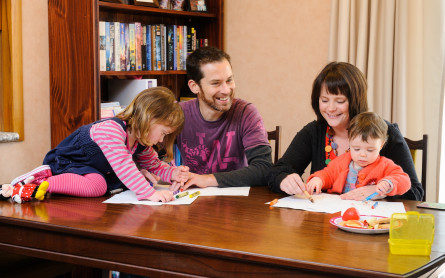KiwiSaver



Planning & budgeting
Saving & investing
KiwiSaver
Tackling debt
Protecting wealth
Retirement
Home buying
Life events
Setting goals
Money tracking
Plan your spending with a budget
Getting advice
Studying
Get better with money
What pūtea beliefs do you have?
How to save your money
How to start investing
Find a financial adviser to help you invest
Your investment profile
Compound interest
Net worth
Types of investments
Term deposits
Bonds
Investment funds
Shares
Property investment
How KiwiSaver works and why it's worth joining
How to pick the right KiwiSaver fund
Make the most of KiwiSaver and grow your balance
How KiwiSaver can help you get into your first home
Applying for a KiwiSaver hardship withdrawal
How to use buy now pay later
Before borrowing
How to get out of debt quickly
Credit reports
Know your rights
Pros and cons of debt consolidation
Credit cards
Car loans
Personal loans
Hire purchase
Student loans
Getting a fine
What happens if I start to struggle with moni?
How to protect yourself from fraud and being scammed
About insurance
Insurance types
Insuring ourselves
Wills
Enduring powers of attorney
Family trusts
Insuring our homes
Losing a partner
Redundancy
Serious diagnosis
How to cope with the aftermath of fraud
Separation
About NZ Super
This year's NZ Super rates
When you’re thinking of living in a retirement village
How to plan, save and invest for retirement
Manage your money in retirement
Find housing options in retirement
Planning & budgeting
Saving & investing
KiwiSaver
Tackling debt
Protecting wealth
Retirement
Home buying

KiwiSaver

Budgeting

KiwiSaver

Budgeting

Women

Women

Women

Budgeting


Resources
Help with the cost of living
Just wondering
In need of financial help
Booklets
Glossary
Videos
Blogs
View all

You won’t find ‘sanity accounts’ at your local bank, but for Rachel and Paul Dudfield, setting aside some money for fun each week is an important part of their balanced approach to managing their money.
Their carefully developed money plan encompasses every aspect of their lives and has helped them move rapidly up the property ladder.
The couple and their two young children Libby and Julia recently moved into their second home, a spacious, four-bedroom house with a study and three bathrooms in Johnsonville, Wellington.
Paul earns $78,000 as a senior test analyst at the Department of Internal Affairs and, before they had children, Rachel worked as a customer services representative. The two met six years ago and after a whirlwind romance, discovered they were a great financial match too.
‘Establishing our common goals and financial strategies early in the relationship and talking regularly about our finances has stopped us from having major arguments over money,’ says Rachel. ‘We were completely open and honest about our finances from the start. It’s a good idea to have the money chat before you get too serious with someone.’
She says their different financial strengths and weakness are complementary.
‘When it comes to goal setting, I’m really good at the medium to long-term saving, but on a week-to-week basis I need Paul to help me stay on track,’ she says.
At Paul’s suggestion they started saving to buy a house – before they had even moved in together. Just seven months later the young couple bought their first home. Paul had been saving for a house before he met Rachel and put up most of the money for a deposit. A small loan from Rachel’s dad that they agreed to repay alongside their mortgage repayments helped seal the deal. Rachel says they ‘moved in on the bones of their arse’, outfitting their home with cheap, second-hand furniture.
Rachel says it was living with Paul that proved the catalyst for her new attitude towards money.
‘Having a credit card used to be fun, even though I never managed to pay off what I owed in the interest-free period. But now I make a point of not having one.’
Combining their bank accounts and sharing joint responsibility for their finances was a wake-up call.
‘It was no longer my money but “our” money, and paying the mortgage became all important. We paid off as much of the mortgage as we could manage, making sure we paid more than the minimum. We knew it would be tougher to pay off once we had children and we’d only have Paul’s income,’ she says.
Everything they spend and save is tracked and updated on a spreadsheet to help them measure how quickly they are reaching their goals.
‘It’s great having goals and enjoying the rewards. For instance, we put $5 a week aside for Christmas presents so there’s no financial stress over the New Year.’
In the medium term the aim is to renovate their new home to increase its value.
‘We DIY almost everything. Paul and my Dad installed our old house’s kitchen. We shopped around and got really good deals.’
Their main focus for the future is to pay off the mortgage and have enough money to enjoy their retirement. Both have KiwiSaver accounts, although they are both taking a contributions holiday until Rachel returns to work.
While previous generations may have used jam jars for their savings, the Dudfields have nine separate savings accounts.
‘We have a car account that covers WOF, repairs, insurance and registration; a health and pets account which pays for doctor and dentist visits as well as our dog’s registration and vaccinations; a house repair and DIY account; and two accounts for emergency funds. When our hot water cylinder burst it meant we were able to use the $1,300 in one of the emergency fund accounts to soften the blow.’
The couple also have a rates account and a $40 spare account for miscellaneous one-off items such as birthday presents.
‘It stops us dipping into the other accounts,’ says Rachel. ‘And of course, we have our sanity account.’
The sanity account provides her with $40 a week and Paul $30 to spend on whatever they want.
‘I get more because I have to spend the whole day with the children,’ she laughs. ‘But Paul’s saving prowess puts me to shame. He doesn’t even spend his $30 every week but saves it so he can buy a new phone or games – it’s insane how he manages to hold back.’
The couple’s organisational skills are legendary amongst their friends.
‘I know this may seem a bit weird, but we have all our fixed automatic payments like our insurance, phone, power and Internet saved a year in advance,’ she says. ‘And we buy our power online in summer at a lower price than we would if we bought it in winter,’ says Rachel.
The pair’s financial planning also extends to their family – they patiently saved for two years before Julia was born.
To prepare they practised living just on Paul’s salary to realise the impact that a drop in income would have when Rachel gave up work to look after their children. They decided to buy major new items like a washing machine and a big television before Julia arrived and while they still had two incomes.
Rachel kept their costs for baby gear down by borrowing from friends and buying clothing from Plunket sales and Trade Me.
‘Having young children is a lifestyle, and we don’t go out to posh restaurants, get drunk and taxi home, but that doesn’t mean we don’t have fun. We go out on movie “cheap nights”, use two-for-one dinner vouchers and swap babysitting duties with friends. It also helps that Paul makes homebrew beer – $20 for 24 litres.’
Rachel says she feels rewarded by her family’s approach to money and is happy to embrace a ‘cheap and cheerful’ lifestyle.
‘It’s satisfying to know that we’re sensible. If something goes wrong there’s money set aside to deal with it,’ she says.
5 steps to get your $521
1 Comment
Who’s teaching your daughter (or niece, or granddaughter) about money?
1 Comment
My Money Sorted: Hilary Barry
2 Comments
My Money Sorted: Ben
3 Comments
My Money Sorted: Daniel
1 Comment
8 ways to hack Christmas when you’re stretching the budget
6 Comments

Use verification code from your authenticator app. How to use authenticator apps.
Code is invalid. Please try again
Don't have an account? Sign up
Or log in with our social media platforms


A Sorted account gives you a personal dashboard where you can save your tools, track your progress and you'll also receive helpful money tips and guidance straight to your inbox.



Comments (0)
Comments
No one has commented on this page yet.
RSS feed for comments on this page | RSS feed for all comments